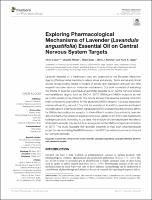Por favor, use este identificador para citar o enlazar este ítem:
https://repositorio.usj.es/handle/123456789/288
| Título : | Exploring Pharmacological Mechanisms of Lavender (Lavandula angustifolia) Essential Oil on Central Nervous System Targets |
| Autor: | López Ramos, Víctor


Nielsen, Birgitte Romme 

Solas, Maite 


Ramírez, María J. 


Jager, Anna K. 

|
| Palabras clave : | Essential oils; Central nervous system; Lavender; Lavandula angustifolia; Lavandula officinalis; SH-SY5Y; Cells glutamate receptor |
| Fecha de publicación: | 19-may-2017 |
| Editorial : | FRONTIERS MEDIA SA, AVENUE DU TRIBUNAL FEDERAL 34, LAUSANNE, CH-1015, SWITZERLAND |
| Citación : | López V, Nielsen B, Solas M, Ramírez MJ and Jäger AK (2017) Exploring Pharmacological Mechanisms of Lavender (Lavandula angustifolia) Essential Oil on Central Nervous System Targets. Front. Pharmacol. 8:280. doi: 10.3389/fphar.2017.00280 |
| Resumen : | avender essential oil is traditionally used and approved by the European Medicines Agency (EMA) as herbal medicine to relieve stress and anxiety. Some animal and clinical studies reveal positive results in models of anxiety and depression although very little research has been done on molecular mechanisms. Our work consisted of evaluating the effects of lavender (Lavandula angustifolia) essential oil on central nervous system well-established targets, such as MAO-A, SERT, GABA(A)and NMDA receptors as well as in vitro models of neurotoxicity. The results showed that lavender essential oil and its main components exert affinity for the glutamate NMDA-receptor in a dose-dependent manner with an IC50 value of 0.04 mu l/mL for lavender oil. In addition, lavender and linalool were also able to bind the serotonin transporter (SERT) whereas they did not show affinity for GABA(A)-benzodiazepine receptor. In three different models of neurotoxicity, lavender did not enhance the neurotoxic insult and improved viability of SH-SY5Y cells treated with hydrogen peroxide. According to our data, the anxiolytic and antidepressant-like effects attributed to lavender may be due to an antagonism on the NMDA-receptor and inhibition of SERT. This study suggests that lavender essential oil may exert pharmacological properties via modulating the NMDA receptor, the SERT as well as neurotoxicity induced by hydrogen peroxide. |
| URI : | https://repositorio.usj.es/handle/123456789/288 |
| ISSN : | 1663-9812 |
| Aparece en las colecciones: | Artículos de revistas |
Ficheros en este ítem:
| Fichero | Descripción | Tamaño | Formato | |
|---|---|---|---|---|
| Lopez-2017-Exploring-pharmacological-mechanism.pdf | 1,12 MB | Adobe PDF |  Visualizar/Abrir |
Este ítem está sujeto a una licencia Creative Commons Licencia Creative Commons

